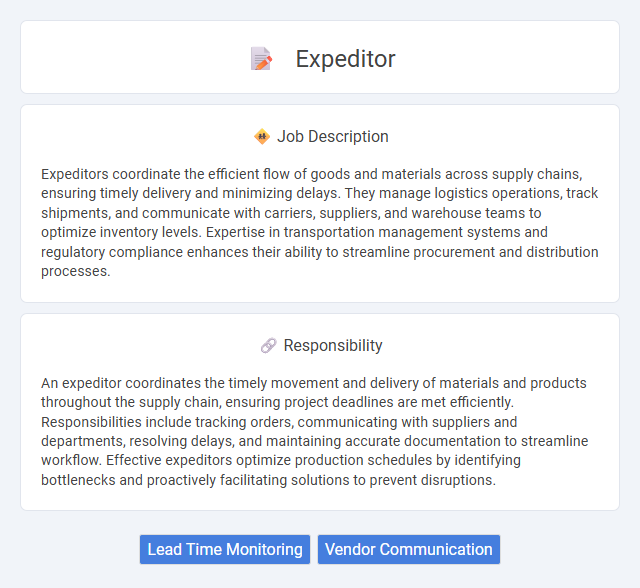
Expeditors coordinate the efficient flow of goods and materials across supply chains, ensuring timely delivery and minimizing delays. They manage logistics operations, track shipments, and communicate with carriers, suppliers, and warehouse teams to optimize inventory levels. Expertise in transportation management systems and regulatory compliance enhances their ability to streamline procurement and distribution processes.
People with strong organizational skills and the ability to work efficiently under pressure are likely suitable for an expeditor role. Those who thrive in fast-paced environments and can communicate clearly with multiple teams may find this job fitting. Conversely, individuals who struggle with multitasking or managing deadlines might not be ideal candidates for this position.
Qualification
Expeditors require strong organizational skills and proficiency in supply chain management software to efficiently coordinate shipments and deliveries. A high school diploma is generally required, while an associate or bachelor's degree in logistics, business, or related fields enhances job prospects. Experience with inventory control, vendor communication, and problem-solving is essential for optimizing workflow and minimizing delays.
Responsibility
An expeditor coordinates the timely movement and delivery of materials and products throughout the supply chain, ensuring project deadlines are met efficiently. Responsibilities include tracking orders, communicating with suppliers and departments, resolving delays, and maintaining accurate documentation to streamline workflow. Effective expeditors optimize production schedules by identifying bottlenecks and proactively facilitating solutions to prevent disruptions.
Benefit
An expeditor's role likely improves production efficiency by ensuring timely delivery of materials and preventing workflow disruptions. This position may reduce project delays and minimize costs associated with inventory shortages or overstocking. Companies probably experience enhanced communication between suppliers and internal teams, leading to smoother operations and higher customer satisfaction.
Challenge
An Expeditor job likely involves significant challenges related to coordinating multiple tasks to ensure timely delivery of materials and products. The role probably requires strong problem-solving skills to navigate delays and communicate effectively with suppliers and internal teams. Managing unexpected disruptions and maintaining workflow efficiency may frequently test an expeditor's ability to adapt under pressure.
Career Advancement
Expeditor roles provide critical experience in supply chain management, enhancing organizational skills and attention to detail essential for career growth. Mastery in coordinating logistics, managing inventory flow, and resolving bottlenecks positions professionals for advancement into roles like logistics coordinator, supply chain analyst, or operations manager. Developing strong communication and problem-solving abilities within fast-paced environments drives upward mobility in the transportation and distribution sectors.
Key Terms
Lead Time Monitoring
Expeditors specialize in lead time monitoring to ensure timely delivery of materials and products throughout the supply chain. They track and analyze shipment schedules, identify delays, and coordinate with suppliers and logistics providers to optimize lead times. Effective lead time monitoring minimizes production downtime and supports efficient inventory management.
Vendor Communication
An Expeditor ensures seamless vendor communication by coordinating order statuses, delivery schedules, and shipment details to prevent delays in the supply chain. They monitor purchase orders closely, providing timely updates and resolving discrepancies to maintain production timelines. Effective vendor communication minimizes disruptions, enhances supplier relationships, and supports efficient inventory management.
 kuljobs.com
kuljobs.com